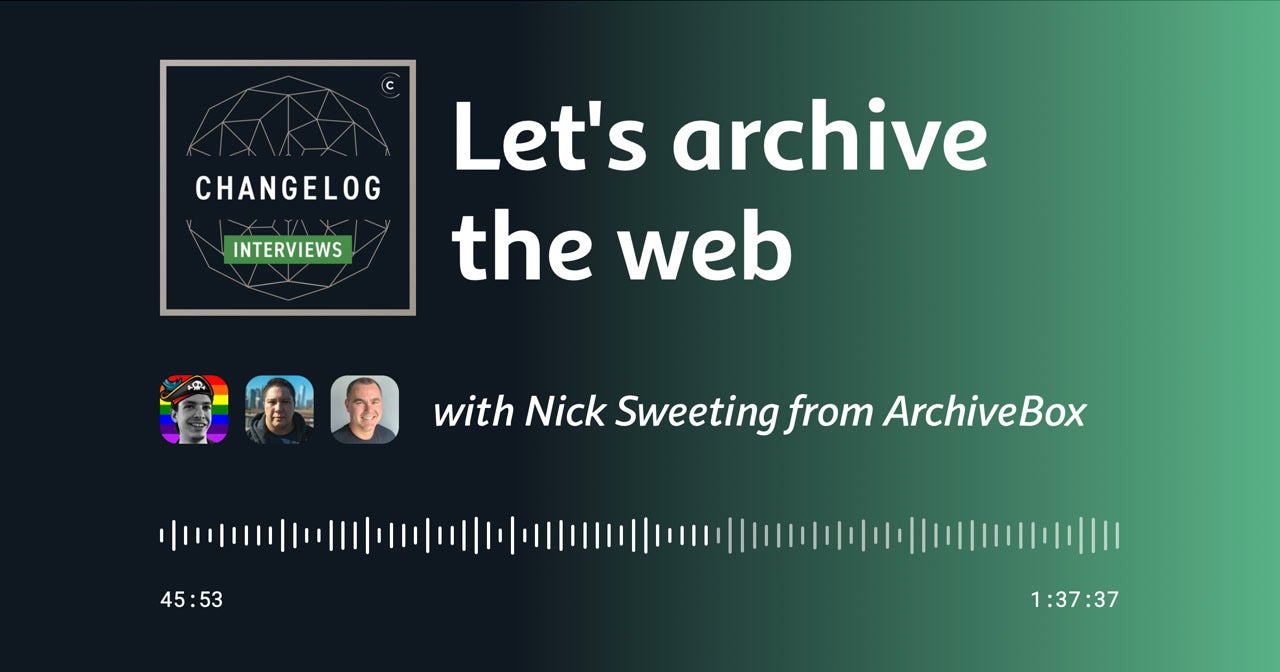Changelog News
Developer news worth your attention
Jerod again! 👋
We’ve arrived at months[11], which means everyone’s breaking out their year-end content. First up, Oxford has selected their word of the year: brain rot
(n.) Supposed deterioration of a person’s mental or intellectual state, especially viewed as a result of overconsumption of material (now particularly online content) considered to be trivial or unchallenging. Also: something characterized as likely to lead to such deterioration.
Speaking of year-end content… we’re preparing for our 7th annual State of the “log” episode. We need your help!
Go here and leave us a voice mail. If your audio is used on the show, we’ll hook you up with your very own Breakmaster Cylinder remix! 🕺
Ok, let’s get into this week’s news.
🎙️ Let’s archive the web
Nick Sweeting joins Adam & Jerod to talk about the importance of archiving digital content, his work on ArchiveBox to make it easier, the challenges faced by Archive.org and the Wayback Machine, and the need for both centralized and distributed archiving solutions.
🧐 If not React, then what?
In the hopes of steering the next team away from the rocks, Alex Russell dives deep on why he believes “nobody should start a new project in the 2020s based on React. Full stop.” His overarching message:
Frameworkism isn’t delivering. The answer isn’t a different tool, it’s the courage to do engineering.
I’ve been preaching similar things around these parts basically forever. Not against frameworks, per se, but against the belief that the next framework will deliver us from whatever self-constructed hellscape of a codebase we’re currently abiding in. This statement rings particularly true:
A shocking fraction of (decent, well-meaning) product managers and engineers haven’t thought through the whys and wherefores of their architectures, opting instead to go with what’s popular in a sort of responsibility fire brigade.
💸 The real cost of knowledge silos
Csaba Okrona takes note that the SO survey revealed 45% of developers hit knowledge silos three or more times per week. Here’s what keeps him up at night:
- Engineers feeling frustrated and isolated
- Innovation dying in departmental dead ends
- Your best people solving the same problems over and over
After years of scaling engineering teams, Csaba has identified four core problems that create and reinforce knowledge silos:
- The Vertical Information Trap
- The Documentation Curse
- The Onboarding Gap
- The Tribal Mindset
Check his article for descriptions of each. What’s the path forward? Csaba says:
Want to break this cycle? Start rewarding the sharing of knowledge more than its possession. Make “multiplier effects” part of your promotion criteria. Celebrate the engineers who make others better.
🗓️ Markwhen is like Markdown for timelines
This project by Rob Koch looks really well-made and full-featured!
A markdown-like journal language for plainly writing logs, gantt charts, blogs, feeds, notes, journals, diaries, todos, timelines, calendars or anything that happens over time.
Rob hasn’t merely designed the Markwhen language, he also created Meridiem, a collaborative editor for it that supports custom commands, snippets, visualizations, autocomplete & more!
Oh, and he built a CLI, an Obsidian Plugin & a VS Code extension…
💰 Debug faster with Sentry’s AI tools
Thanks to Sentry for sponsoring Changelog News
Next Tuesday, join Jenn Mueng & Ram Senthamarai, the engineers behind Sentry’s latest AI-powered tools. They’ll walk you through Sentry’s approach to AI and share how they’re seeing it reshape the developer experience.
This session is all about debugging faster with Sentry’s AI tools and includes a live demo of what they’ve built—no AI hype here, just smarter alerts, issue summaries, and suggested fixes to get you back to building faster.
During the session, you’ll learn:
- How priority alerts and issue grouping work to highlight what matters
- How to use anomaly detection to spot issues before they blow up
- How to integrate automatic issue fixes right into your workflow
It will close with a live Q&A, where they’ll answer your questions, dive deeper into how these features work, and show you how to make the most of them in your workflow. Don’t miss it!
🆒 M4 Mac mini’s efficiency is incredible
Jeff Geerling is quite impressed by Apple’s latest iteration on the Mac mini:
I expected M4 to be better than M1/M2 (I haven’t personally tested M3), and I hoped it would at least match the previous total-system-power efficiency king, a tiny arm SBC with an RK3588 SoC… but I didn’t expect it to jump forward 32%. Efficiency gains on the Arm systems I test typically look like 2-5% year over year.
The M4 mini I just bought reaches 6.74 Gflops/W on the HPL benchmark…
The chip isn’t the fastest at everything, but it’s certainly the most efficient CPU I’ve ever tested. And that scales down to idle power, too—it hovers between 3-4W at idle—which is about the same as a Raspberry Pi.
⚖️ Comparing AWS S3 with Cloudflare R2
Sylvain Kerkour took the time to draw a comparison of Amazon’s O.G. S3 service with Cloudflare’s competitor across 1) price, 2) performance & 3) user experience vectors. I’ll leave the details for you to plumb on your own time, here’s Sylvain’s conclusion after all the hard work had been put in:
I initially started this conclusion along the lines of “S3 strengths are… R2 strengths are … So now the decision is up to you”, but damn the blandness!
Honestly, I see only a few reasons to use S3 today: if ~40ms of latency really matters, if you already have a mature AWS-only architecture and inter-region traffic fees are not making a dent in your profits, or if it’s really hard to bring another vendor into your infrastructure for organizational reasons. That’s all.
Maybe 90%+ of projects and organizations will be better served by Cloudflare R2.
We’ve been on R2 for over a year and while it has a few rough edges (reduced 3rd-party client support, custom domain requirement, off the top of my head) it has saved us a bunch of money on egress fees!
🎞️ DHH talks BDFLs, WordPress, SQLite, Rails
In light of the recent WordPress drama, DHH answers the question, “What happens to Rails if you go on a bender?”
🛀 Good software development habits
Zarar shares ten software dev habits that are working for them:
It’s easy to pick up bad habits and hard to create good ones. Writing down what’s working for me helps me maintain any good habits I’ve worked hard to develop. Here’s an unordered list of 10 things that have helped me increase speed and maintain a respectable level of quality in the product I’m currently developing.
I agree with most of these, except for the “copy-paste is OK once” habit. I’ve found that copy-paste should be used at least twice before you have enough information to create a good abstraction.
⏲️ The skill that is not-doing
Dylan Fitzgerald:
It’s compellingly easy, even invisible, to stay in the loop of doing… The thing is: sometimes, the best use of your time, the most effective action, is to do nothing. To sit, wait, and let the system that you’ve put into motion move without your intervention. To not mess with what’s working, and to make time and space for your team to figure things out for themselves.
Co-signed!
💰 WorkOS launch week!
Thanks to WorkOS for sponsoring Changelog News
🏁 Launch Week is a wrap! 7 new features and announcements in 5 days. Here’s everything WorkOS shipped for Launch Week 2024:
- Passkeys - A safer and simpler alternative to passwords
- Radar - Real-time protection against bots, fraud, and abuse
- Fine-Grained Authorization - Granular access control at scale
- Widgets - Complete enterprise features in your app in just a few lines
- Actions - Customizable registration and authentication flows within AuthKit
- Entitlements - Entitlements sync from Stripe into your app with zero code
- Next.js B2B Starter Kit - Quick start SaaS stack to go faster from 0 to 1
📏 Can you measure a tech team’s efficiency?
Dave Anderson addresses this controversial question (which we spoke about at some length with Abi Noda on Friends). Dave’s conclusion (back in 2022):
- If technology workers are doing measurable work, they’re doing easy work. They’re doing repetitious work. This work isn’t usually the most valuable work, and you should minimize it when possible.
- If technology workers are adding huge value, such as building new things their company has never built (and perhaps the world hasn’t built), then their work is hard to measure. They can swag, but not accurately predict their work.
📐 It’s dangerous to go alone. Take this.
- htmy
- Nothing is something
- The Influence of Bell Labs
- Shipping is capturing value
- lla: A modern alternative to ls
- Good software development habits
- Must-have Obsidian Plugins for 2025
- A short introduction to automotive Lidar tech
- Why am I writing a JavaScript toolchain in Zig?
- OpenLLMetry: observability for your LLM application
- Amazon S3 adds new functionality for conditional writes
- Running LLMs locally, on any hardware, from scratch (llama.cpp guide)
That’s the news for now, but we have some great episodes coming up this week:
- On Wednesday: Akon joins me from Hack Club’s new High Seas competition!
- On Friday: We talk Shop with Chris Coyier & Dave Ruport!
Have a great week, leave us a voice mail for state of the “log” & I’ll talk to you again real soon. 💚
–Jerod

